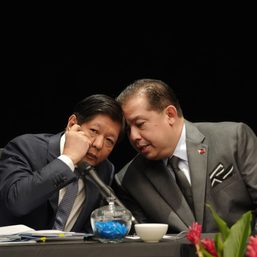SUMMARY
This is AI generated summarization, which may have errors. For context, always refer to the full article.

MANILA, Philippines – The proposed establishment of a Maharlika Investment Fund (MIF) breezed through the House of Representatives, with 279 lawmakers voting in favor of its passage.
But six legislators – all from the House minority – stood their ground and voted no to House Bill No. 6608.
They are:
- Basilan Representative Mujiv Hataman (House deputy minority leader)
- ACT Teachers Representative France Castro (House deputy minority leader)
- Camarines Sur 3rd District Representative Gabriel Bordado (House assistant minority leader)
- Gabriela Representative Arlene Brosas (House assistant minority leader)
- Albay 1st District Representative Edcel Lagman (Liberal Party president)
- Kabataan Representative Raoul Manuel
Rappler looked into their speeches and written manifestations on why they rejected the controversial legislation, and found common themes in their explanations.
Economically challenging times
The current economic environment is not ripe for the establishment of a sovereign wealth fund, according to them.
Lagman and Brosas cited the country’s huge fiscal deficit (P1.1. trillion as of October 2022), debt stock (P13.64 trillion), inflation (8% in November), and poverty rate (49% of Filipinos considered themselves poor in the third quarter survey of the Social Weather Stations).
“Whatever investible resources the government and the government-owned and controlled corporations have, must not be parked in long-term contingent investments. They must be invested today for human development and sufficient allocations for education, health, employment, food security, and basic infrastructure,” Lagman said.
“Creating a sovereign wealth fund that is purely based on existing financial resources of government financial institutions (GFIs) rather than on surpluses amid widening fiscal deficit, record-high national debt, and sham economic recovery dangerously puts Filipinos’ money on track to a disaster,” Brosas added.
Investment risks
The MIF’s seed capital will come from dividends of the Bangko Sentral ng Pilipinas (around P35 billion for the first year), and the investible funds of the Land Bank of the Philippines (P50 billion) and the Development Bank of the Philippines (P25 billion).
Hataman asked: if GFIs are making a profit on their own, why change the system now?
“Why would we risk the viability of financial institutions on investments that have high risks even though they might generate huge returns? Do we have a feasibility study to back the establishment of the Maharlika Investment Fund?” he added.
Manuel pointed out that House Bill No. 6608 is not grounded on basic financial literacy concepts.
“If a family is drowning in debt, it is better not to make more risks,” he said.

Prone to corruption
Opposition lawmakers also insisted that the MIF is not structurally sound enough to withstand attempts at corruption.
“No one from the board of directors is really independent,” Castro argued. She said that the five independent directors of the Maharlika Investment Corporation will be chosen by the advisory board anyway, half of which will be composed of Cabinet secretaries who report to the Philippine president.
The MIF seeks to prioritize investments in infrastructure and developmental projects, but Manuel said these are “vulnerable to corruption.”
“Moreover, the fund is also vulnerable to the interests of big private investors who can jump into the fund,” he added.
Lack of sufficient justification
Bordado said none of the country’s economic indicators translate to wealth and surplus.
“By this very definition, we do not meet the fundamental requirement in establishing a strong sovereign wealth fund – excess revenues,” he said.
Lagman and Brosas also pointed out that if the MIF is launched, it would be among the tiniest sovereign wealth funds in the world at P110 billion.
“How can we compete globally for investors given that the MIF is embarrassingly minuscule since we cannot afford a more substantial and comparable start-up capital?” Lagman asked.
Bill railroaded
Castro said the House majority did not satisfactorily seek stakeholders’ thoughts on House Bill No. 6608.
“The bill was approved by the House banks committee even before it conducted a ‘briefing’ with the stakeholders. Take note, it was really just a briefing and not a consultation,” she claimed.
For Hataman, the speedy passage of the bill is unacceptable.
The bill was filed on November 28, approved by the banks committee on December 1, reached the plenary on December 12, and approved on final reading on December 15.
“All in all, from filing to final approval, it only took members of the House of Representatives 18 calendar days to give final approval to the Maharlika Investment Fund bill,” he said. “For me, this is not enough time to pass the bill especially since many people and sectors have expressed their opposition towards many of the bill’s provisions.”

What the House leadership says
Despite the manifestations made by lawmakers from the minority, Speaker Martin Romualdez regarded the passage of the Maharlika Investment Fund bill as one of the major accomplishments of the House under his leadership.
“This Maharlika bill is our response to the need for a more efficient, steady, and reliable growth of the nation’s coffers, using well-thought-of investment gains that will ultimately redound to the benefit of the Filipino people. This bill when enacted into law would help sustain and fast-track the momentum for the Philippine economic growth,” he said.
“We view the proposed Maharlika Investment Fund Act as an effective vehicle to execute and sustain high-impact infrastructure projects, urban and rural development, agricultural support, and other programs that would generate more income and economic activity in the country,” Romualdez added.

What’s next
While the bill already hurdled the House, it’s a different ball game in the upper chamber, where senators are more wary about the proposal.
Since the 19th Congress is on a holiday break, the Senate could take on the proposal in mid-January, and start hearings by mid-February, Senate President Juan Miguel Zubiri said.
Read Rappler’s other stories, in-depth pieces, and explainers on the contentious legislation:
- Romualdez, Sandro Marcos file bill creating PH sovereign wealth fund
- FAST FACTS: What is the Maharlika Wealth Fund?
- EXPLAINER: Does the P275-B ‘Maharlika Wealth Fund’ have any safeguards?
- Ex-president Gloria Arroyo defends proposal to establish Maharlika fund
- EXPLAINER: Will a sovereign wealth fund work for the Philippines?
- After backlash, House leaders spare GSIS, SSS from Maharlika fund
- NEDA chief advises caution over Maharlika fund: ‘It’s a governance issue’
- Maharlika fund seed capital to shrink after BSP replaces SSS, GSIS
- Marcos breaks silence, says Maharlika fund advantageous ‘for sure’
- Maharlika fund bill now contains jail time provision for fraudulent actors
- House passes Maharlika fund bill after Marcos certifies it as urgent
– Rappler.com
1 comment
How does this make you feel?





Deep appreciation to the six HOR lawmakers who opposed the passage of the Maharlika Investment Fund Bill. It was indeed a losing battle but they fought bravely nevertheless. No matter how strong their arguments were, the majority’s impulse of Greed is stronger.